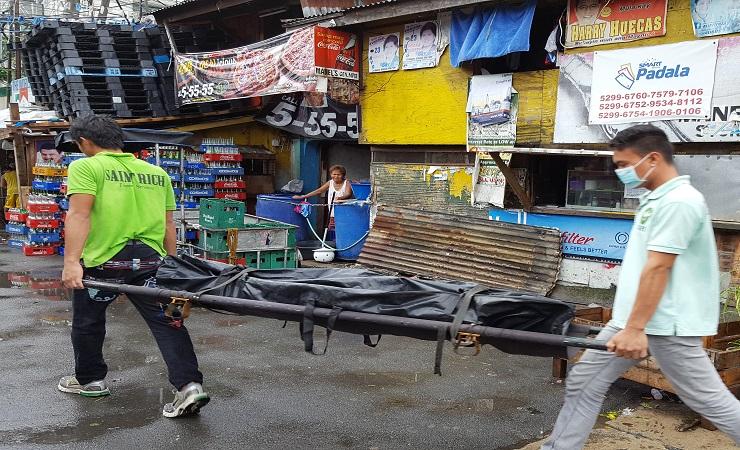ASIACALLING
Duterte’s dirty drug war, eerie echoes to the days of martial law
"International rights groups have condemned the more than 3,000 killings that have followed."

More than 3,000 people have been killed in the Philippines in the past three months, in a brutal crackdown on drugs and crime under new President Rodrigo Duterte.
I recently traveled to the capital Manila to investigate and while I was there I met former priest turned human rights activist, Max de Mesa.
The extrajudicial killings happening now, he says, have frightening parallels to the days of martial law.
“Hello good afternoon. I would like to show to you the museum, that’s is in relation to martial law, and most of these are actually part of the 21,000 cases.”
That’s Max de Mesa, and those 21,000 cases he mentioned, well the hard copies of those are kept in here, the case files that document the atrocities that occurred under Martial Law.
They’re stored inside these big, old gray, filing cabinets that take up one wall in the Museum of Courage and Resistance in Quezon City.
Another wall is lined with black and white portraits, people that were forcibly disappeared, killed, or held as political prisoners.
A young Max, circa 1974, is there too.
“I was a former priest, I was saying mass and I was accused of recruiting the parish for the New People’s Army’s forces, by showing a film regarding it,” says Max, of when he was arrested.
Max was detained for his suspected links to the New People’s Army (NPA), the communist party, in a jail not far from here – where he was forced to listen to members of his parish as they were tortured.
Today Max is the chairman of the Philippine Alliance for Human Rights and he works here in the same building as the museum.
The exhibition includes artworks and sculptures created by political prisoners in jail, old posters, documents and reports, cameras and other recording devices from that time, and even a fake solitary confinement cell.
As Max shows me through the exhibition he tells me how in the 70s and 80s, unidentified bodies would turn up in the street, the heads wrapped in masking tape and signs by the body labeling them a communist.
Today the exact same method is being used in the war on drugs, only the signs on the dumped corpses read ‘drug dealer’ instead of communist.
Here’s Max.
“The vigilante type, both open and clandestine would be at work, so nobody was held accountable,” he says, “In fact some would openly display, even the beheading, and also of displaying the bodies in this regard. So the direction that we are taking, if this continues might be headed to that direction, if not worse.”
Former dictator Ferdinand Marcos declared martial law in the Philippines in 1972, a move he said was justified to stop the growing threat of communism.
In the decade to follow there were more than 2,000 summary executions, 7,000 more were tortured, while about 1,000 people were forcibly disappeared.
Back then the enemy was communism, says Max – today it is drugs.
“Anybody who criticises the government or makes a protest would immediately get labeled, oh maybe you are a communist, and that’s why you are protesting,” he says, “In the same manner, well if you talk to that guy maybe you are a drug addict or are working for a drug runner, something of that sort.”
President Duterte was elected on a pledge to rid the Philippines of drugs and crime within six months in office. He’s also joked about bringing back martial law, and fattening up the fish of Manila Bay with the corpses of drug dealers.
International rights groups have condemned the more than 3,000 killings that have followed, and the president for promising to pardon law enforcement officers if they are charged with wrongdoing – for effectively issuing a license to kill.
Max says it’s government impunity, all over again.
“The policy of being able to weave out of these technicalities is very dangerous because it also creates a mentality which was there before,” he says, “Since we are in charge we can do this and the law can even be used for us and this human rights, we can also just do away with.”
Despite global concerns, at home Duterte’s drug war appears to be very popular.
Drugs and crime are seen a big problems and Duterte has managed to effectively appeal to these concerns, at just the right time.
Here’s Max again.
“It evokes something that we might of heard in history in another country wherein the frustrations of a people converge with somebody who is charismatic,” he says, “And suddenly labeled that one area of the population would supreme in their humanity and the others are cockroaches and has to be wiped out so that it doesn’t stain their humanity.”
And that notion is at the heart of his Duterte’s apparent disregard for human rights.
That if you’re a good guy you get them. And if you’re a bad guy – a cockroach, a drug user, dealer, or criminal – you don’t.
It’s a slippery slope and there are deep concerns at just how far Duterte will go.
- Kate Lamb
- Max de Mesa
- Philippines
- Extrajudicial killings Philippines
Komentar (0)
KBR percaya pembaca situs ini adalah orang-orang yang cerdas dan terpelajar. Karena itu mari kita gunakan kata-kata yang santun di dalam kolom komentar ini. Kalimat yang sopan, menjauhi prasangka SARA (suku, agama, ras dan antargolongan), pasti akan lebih didengar. Yuk, kita praktikkan!